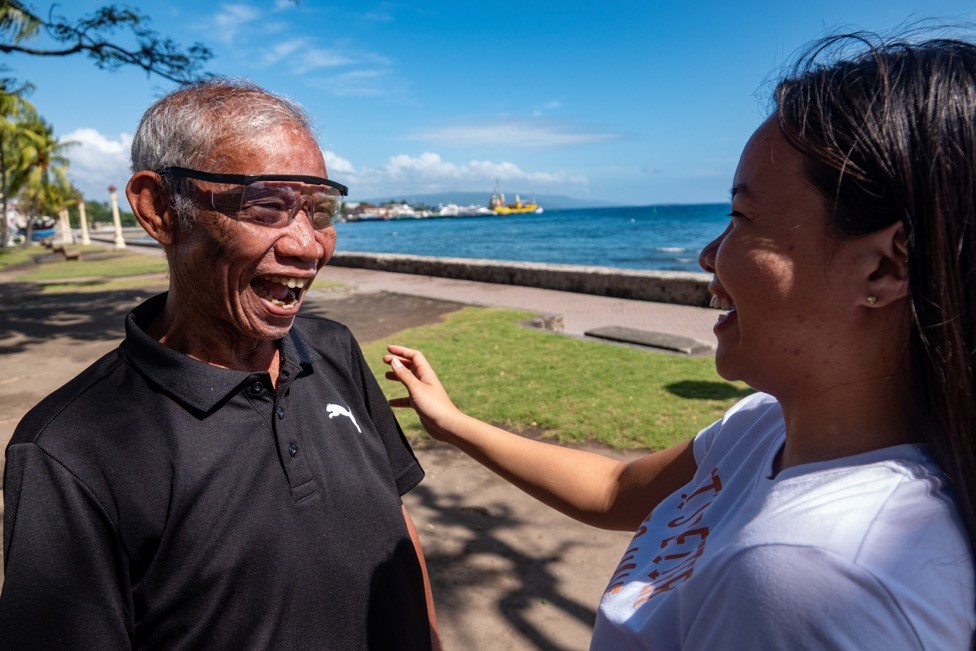On the opening day of Negros Oriental Provincial Hospital (NOPH) Eye Centre, people from all over Negros Oriental province flocked to the capital Dumaguete to receive free eye health services.
In the Philippines, eye health services are usually accessed in private hospitals and clinics where an upfront payment is required for those without health insurance.
So when 77-year old Harid heard that the Provincial Hospital would have its own eye centre, he grabbed the opportunity and became the eye centre’s Patient #001.
Harid heard about the new eye centre through his granddaughter Michelle, a school teacher who joined a Behavior Change Communication workshop organised by The Fred Hollows Foundation with the support of the Australian NGO Cooperation Program (ANCP).
In the workshop, Michelle co-created eye health messages to encourage people to take care of their eyes. Michelle knew that her grandfather – who has cataract on his right eye – was the perfect target for the eye health messages they created in the workshop.
“When I joined the workshop, I learned that blindness is not a ‘normal’ thing that just comes with old age. Blindness – especially cataract – can be cured if detected early on.”
“After that, I immediately convinced my grandfather to seek treatment for his cataract,” Michelle said.
Harid and his family belong to the Ata group of Negros Oriental – an Indigenous community with long traditions in the island. For almost two decades now, Harid has been the agurang, or chieftain of the Ata community in Barangay Aniniaw in La Libertad.
“If I was not informed to go to the eye centre, I may resort to our traditional beliefs. In our community we usually use herbs, incense, or drop breastmilk on our eyes to cure eye problems. At times, we also use special chants,” Harid said.
Luckily, Harid doesn’t have to concoct any special remedy for his one-year old cataract. He is informed that Philhealth will be able to cover his eye surgery free of charge.
Harid has lived a long life of hard work and dedication to his family and community. He has 12 grandchildren and was able to support five children by working on their ancestral land.
As a farmer, he plants corn, rice, and other crops. He also takes care of his cattle and chicken.
“I get tired because I’m old, but I can still work, so I still work,” Harid said.
But his vision started to deteriorate and it was affecting his activities.
“It’s a big hurdle for me. I have problems like double vision, and I can see fire in my eyes. Beyond 20 meters, I can’t see anymore,” Harid said.
Through the assistance of Negros Oriental Provincial Hospital, Harid eventually accessed surgery. Michelle was with her grandfather tevery step of the way, and she was overjoyed when her grandfather could see again.
“I am so happy because my grandfather can see again! Thank you so much to everyone who helped us – the doctors, nurses and staff of the eye centre, as well as The Fred Hollows Foundation,” Michelle said.
Harid is thankful to the range of people who made this moment possible.
“I feel so happy. I feel happy because in less than 24 hours, I can see again,”
“I will keep remembering this moment and I will treasure this experience,” Harid said.
Elle said that in their tribe, one’s victory is everyone’s victory. Harid is convinced that his experience is worth celebrating so he has big plans when he returns to his village.
“As soon as I come back, I want to throw a thanksgiving event for the tribe. It will be in honor of those who took care of me. We will pray and be thankful because this is everyone’s victory.”
“God’s help is not difficult to find because he uses instruments – like The Fred Hollows Foundation – to help other people,” Harid said.








Leave a Reply